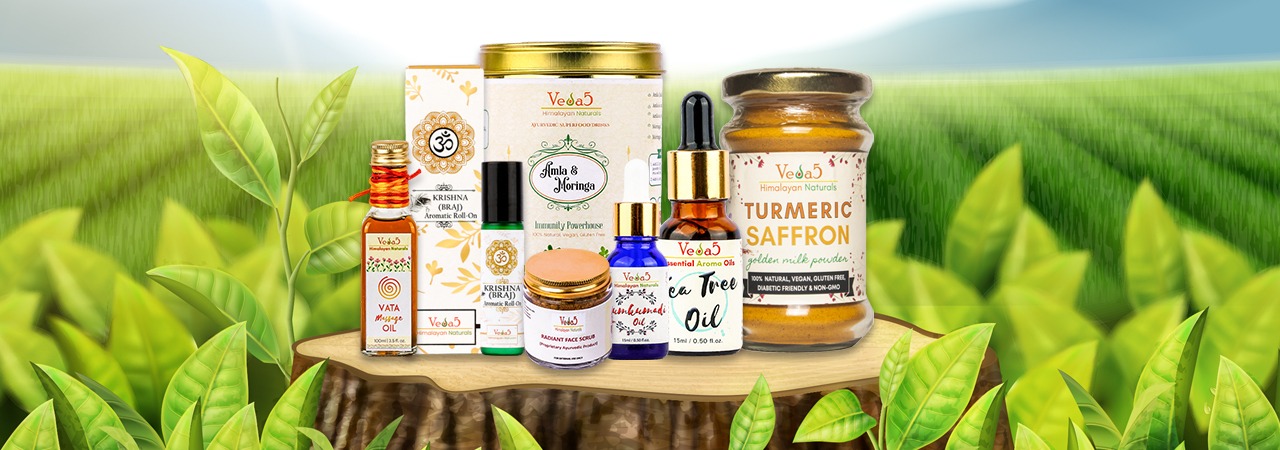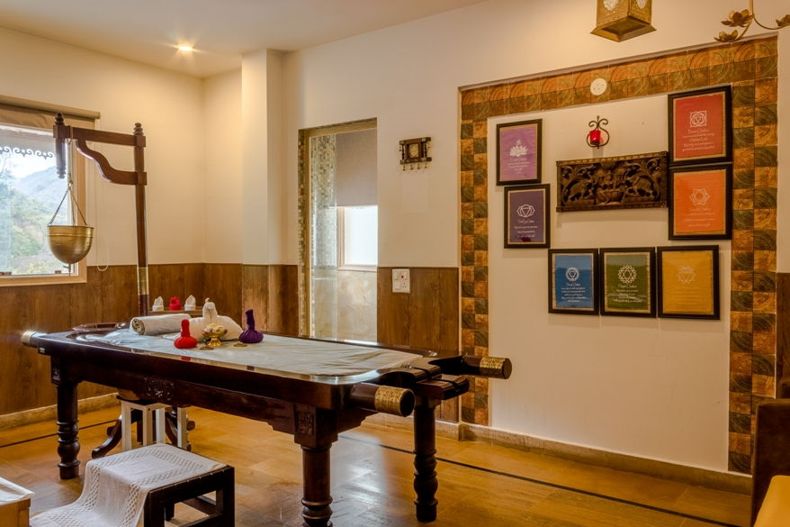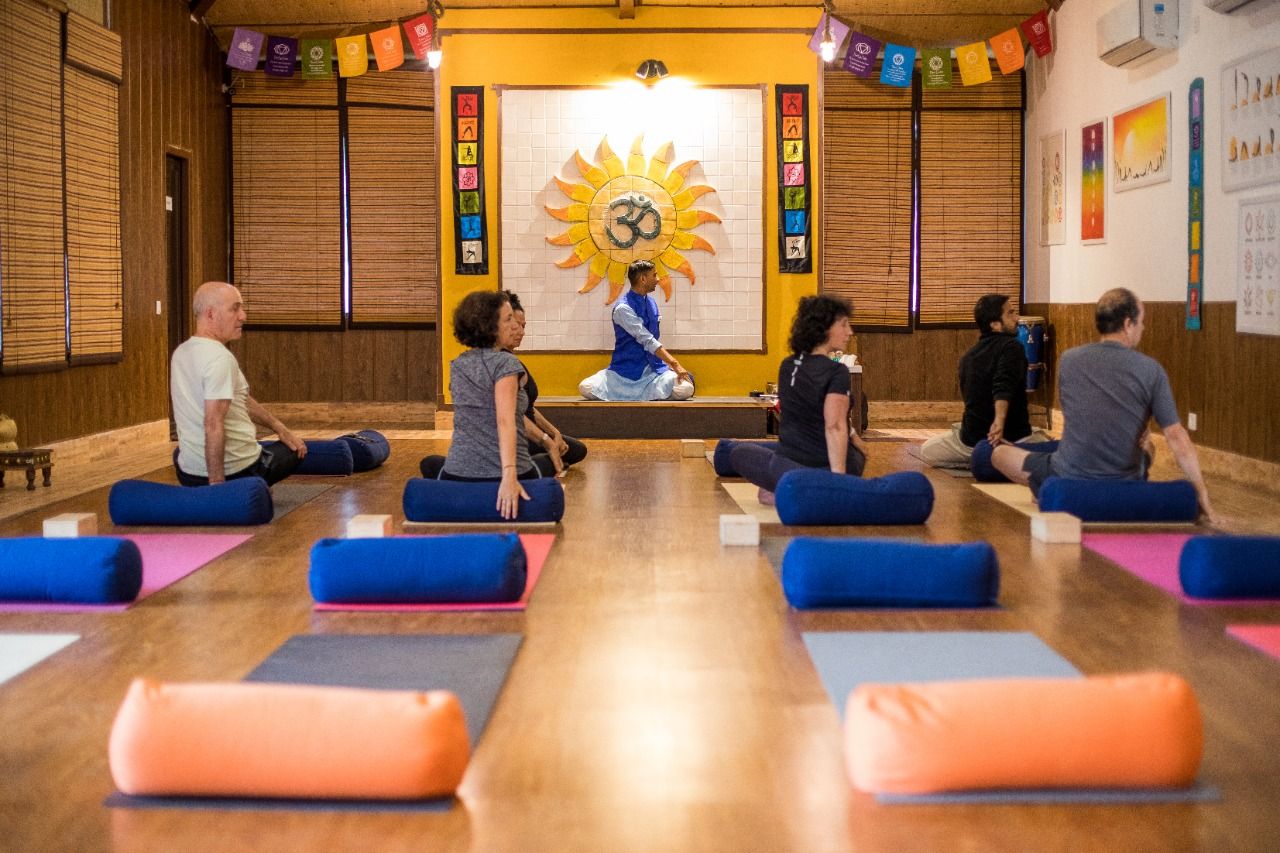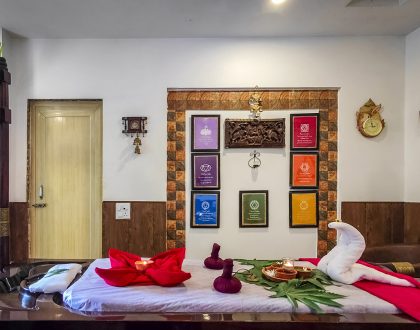Shadrasa – Six Tastes by Veda5, Best Ayurveda & Yoga Wellness Retreat in Rishikesh, Kerala & Goa, India
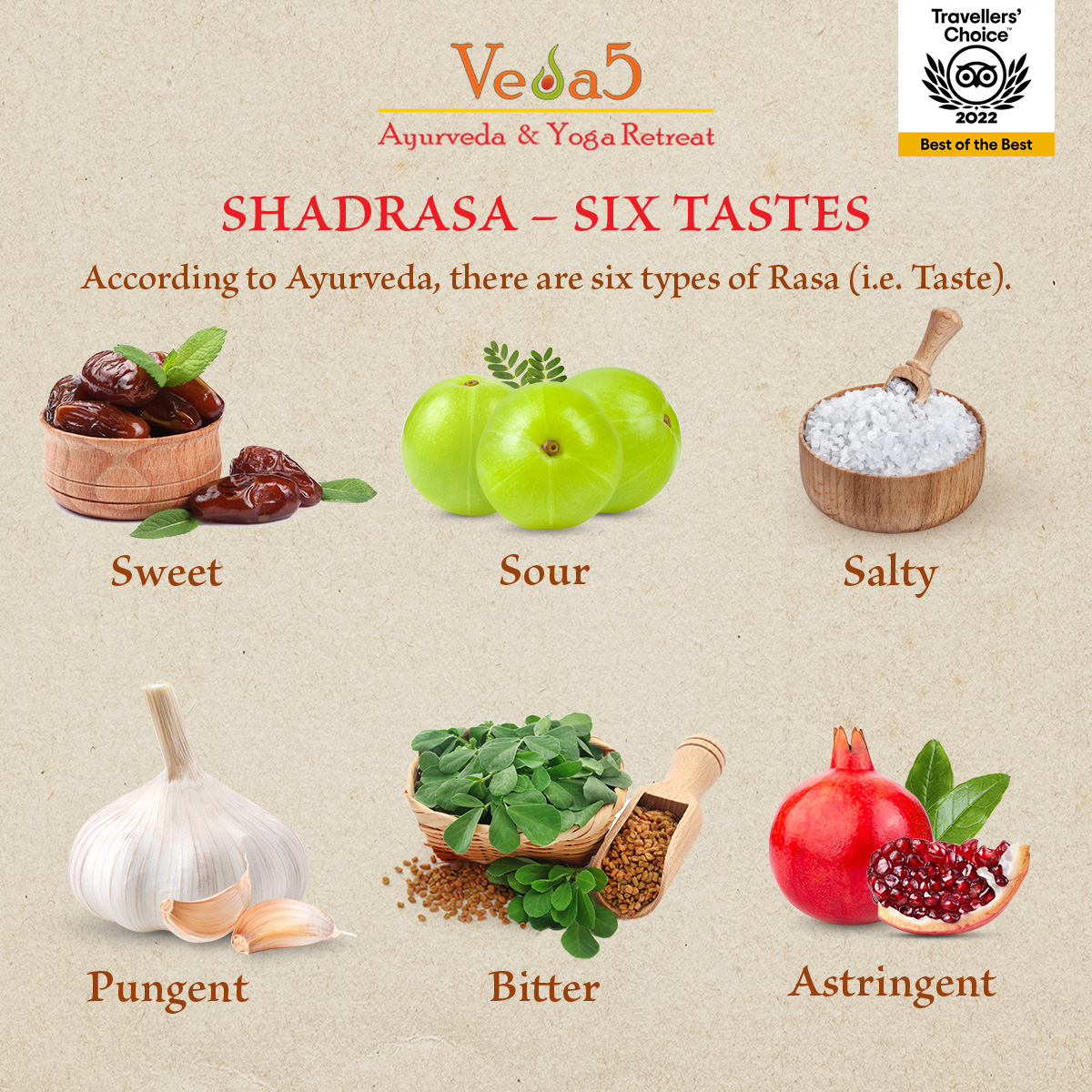
Basic principle of diet in Ayurveda is that physical changes as well as mental effects can be observed after consumption of different food types.
Rasa (i.e. Taste) is the sensation perceived by the tongue. According to Ayurveda, there are six types of Rasa (i.e. Taste). Each taste has an effect on the body as well as mind. The basic principle of diet in Ayurveda is that physical changes as well as mental effects can be observed after consumption of different food types. In this way, food can directly and indirectly affect the three doshas (i.e. Vata; Pitta; and Kapha) of an individual.
According to Ayurveda following are the Shadrasa (Six tastes):
1. Sweet (Madhura). Decreases Vata and Pitta; Increases Kapha.
The sweet taste has a cooling virya, with some exceptions, and a sweet vipak. Of all the six tastes, sweet is the most grounding and nourishing. It’s balancing to vata and pitta and, when eaten in moderation, promotes longevity, strength, and healthy bodily fluids and tissues. It’s the taste to emphasize for someone who is trying to gain weight, as it will quickly increase kapha when taken in excess. Its heavy, oily, moist qualities tend to slow down digestion, so it’s often suggested in ayurveda to eat dessert first. The sweet taste abounds in foods such as wheat, rice, maple syrup, brown rice syrup, agave nectar, dates, licorice root, and slippery elm bark.
2. Sour (Amla). Decreases Vata; Increases Pitta and Kapha.
The sour taste has a heating virya and warming, sour vipak. The sour taste stimulates appetite and saliva production, and is stabilizing in its light, heating, and oily properties. But it should be eaten in moderation, for its refreshing influence is strong, and a little bit goes a long way. Sour balances vata, but the sour taste tends to unbalance pitta with heat, and can suffocate kapha with its slippery, grounding nature. Sour improves appetite, digestion, and elimination, and includes such foods as lemons, ume plum, amla berry (sour Indian gooseberry), vinegars, and pickled and fermented foods.
3. Salty (Lavana). Decreases Vata; Increases Pitta and Kapha.
The salty taste has a heating virya and a sweet vipak. Salt is grounding and moistening, which makes it best for vata. Its warmth and unctuousness helps vata stay grounded and hydrated, but its heat may aggravate pitta. Kapha will be attracted to the warmth of salty flavors, but this flavor tends to promote more weight gain and water retention than kapha really wants. Salt stimulates digestion, helps maintain proper electrolyte balance, softens tissues, and has a mildly laxative effect when taken in moderation. Sea vegetables, salt, tamari, black olives, and processed foods are laden with the salty rasa.
4. Pungent (Katu). Increases Vata and Pitta; Decreases Kapha.
Air and fire give rise to the pungent rasa whose virya is heating and vipak is pungent. The hottest of all the rasas, the pungent taste improves appetite, clears sinuses, stimulates blood circulation, and motivates the senses. The pungent rasa will taste hot and stay hot from start to finish, thereby benefiting kapha more than vata. The pungent taste, with its light and dry qualities, will aggravate pitta quickly. It is sure to balance wet, heavy kapha, but it can be too hot and dry for vata when taken in excess or paired with too many other drying foods. Vata does best when the pungent taste is combined with sour, sweet, or salty foods. Fresh ginger, hot peppers, onions, garlic, mustard, and hot spices all share the quality of pungency.
5. Bitter (Tikta). Increases Vata, Decreases Pitta and Kapha.
Of the six tastes, bitter is the coolest and lightest, making it best for pitta and least effective for vata, especially when taken without a proper balance of other tastes. Air and ether comprise this rasa, whose virya is cooling and whose vipak is pungent, making it quite cooling in the short term, but warming in the big picture. Kapha benefits from foods like dark leafy greens that abound with the bitter taste while providing calming magnesium and calcium. Dandelion root, turmeric, and fenugreek are also great sources of bitterness with cool and drying qualities. Do not avoid the bitter taste in excess, as it’s known to create immediate coldness that can bring on bouts of grief and depression. Like sour, a little goes a long way. Make the bitter rasa a regular part of your meals but in small amounts. It will enhance the flavor of other foods and help to gently purify and cleanse the body.
6. Astringent (Kasaya). Increases Vata, Decreases Pitta and Kapha.
The astringent taste has a cooling virya and a pungent vipak. It is less cold than bitter but very dry and firm, which makes it a taste for vata to avoid. Many beans and legumes are astringent in nature, as are broccoli and cauliflower, all of which are known to create gas and thus aggravate the vata dosha. Pitta will benefit from the astringent taste’s coolness, while its dry, light qualities help balance kapha. The constrictive nature of the astringent taste will also slow down digestion. Green grapes, unripe bananas, cranberries, pomegranates, alfalfa sprouts, green beans, and okra all exhibit the astringent taste. You will know this taste when it makes your mouth pucker and feel dried out.
We can achieve a balance in three doshas by regulating diet. An ideal diet, according to Ayurveda incorporates the six tastes prescribed in the literature and comprises a wide variety of fresh fruits, grains and milk.
At Veda 5 we take care of your diet according to your body type or dosha needed to be balanced prepared by team of best chef’s.
World Class Ayurveda & Yoga Retreats
Veda5 Ayurveda & Yoga retreats are located in Rishikesh, Goa and Kerala. The wellness retreats are run by highly-experienced doctors and offer authentic treatments and customized care for each guest. Veda5 Yoga and Meditation retreats are led by experts and the sessions range from gentle to vigorous to stretch, strengthen, balance and improve the body and mind.
Veda5 Naturals manufactures high-quality Ayurveda and Herbal wellness products formulated in the Himalayas that are natural, non-toxic and unadulterated without synthetic and inorganic chemicals. Please explore and shop our wide range of products on www.veda5naturals.com Veda5 Naturals products also make as great gifts.
Please see the Packages menu on our website to learn in detail about Veda5’s well-designed Ayurveda and Yoga wellness and vacation packages in Rishikesh, Goa and Kerala for which our guests come from around the world to India.
Click here to learn more about wellness through traditional Ayurveda and Yoga in Rishikesh, Goa and Kerala.
Click here to send us your booking requirements. You’re welcome to contact us for more details.
Veda5 looks forward to hosting you soon!

